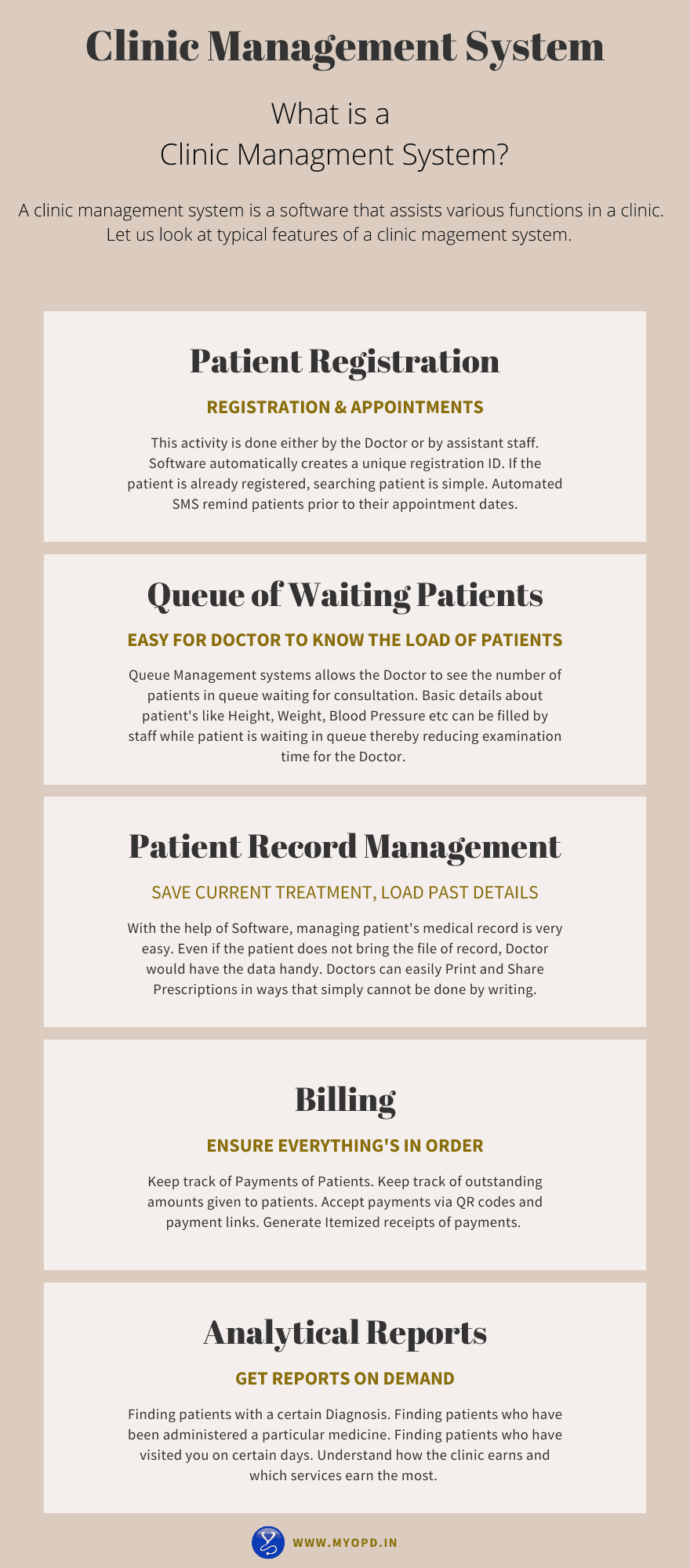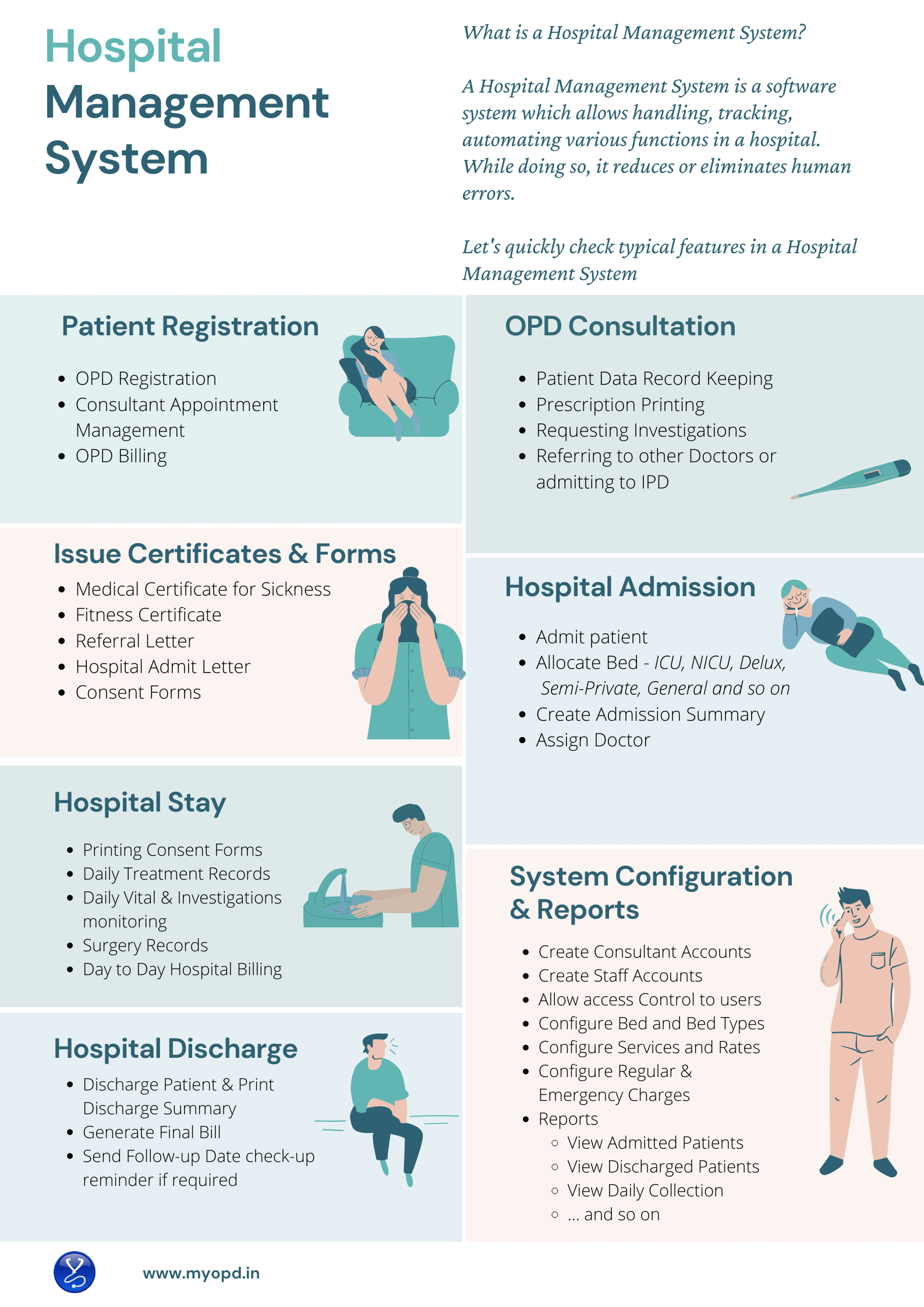Hospital Management Systems – 5 Points to help you choose right one
1. Size of the Hospital
This is the most important criteria while selecting a Hospital Management System (HMS). Hospitals are of multiple sizes. A good factor to gauge the size of the Hospital is to check the number of Beds in the Hospital.
Why is size important?
Size is important because it defines the complexity involved in running and managing a hospital. A hospital with 500 Beds is a completely different proposition than a hospital with 50 Beds than a hospital with 5 Beds. So requirements of a Hospital with 500 Beds are different than requirement of Hospital with 50 Beds.
A Hospital Management System built for a 500 Bedded hospital may not necessarily be the right system for a 5 Bedded hospital.
Why do we think so?
Because, a bigger Hospital has
- Many more Departments
- Different compliances than a smaller hospital
- Trained staff readily available for using the software
- Higher budget than smaller hospitals
So to begin with, identify the size of your Hospital today and possibly for the next few years.
2. Typical Usage in the Hospital
Hospital Management Systems come with multiple features. This article gives you an overview of those. Understand which features are important for your Hospital.
We have seen some people wanting to use HMS only for billing and nothing else. We have also seen some who want to use HMS also to calculate the staff attendance report and salary management.
Here are some questions which will help you decide:
- Who is going to use this system in my Hospital? Doctors, Reception Staff, Billing Staff, Laboratory Staff, Pharmacy Staff and so on.
- Are Doctors going to operate the system for entering data like patient’s prescription?
- Is my staff going to give appointments of Doctors via the software? Will patients take appointments online?
- Do I need to give patients a neatly made, professional looking, Discharge Summary and Hospital bill for insurance claims or otherwise.
Pricing of the system will increase based on the number of features you choose. That is the reason why we mentioned in point # 1 that Hospital size is an important criteria. The features required by a bigger hospital will be more than those of a smaller hospital. If you are a 20 Bedded hospital, ask yourself, do you really need everything that a 200 Bedded hospital is going to use?
3. Cloud Based or On-Premise
Here is a table to differentiate the two options
| Sr. No | Cloud Based | On-Premise |
| 1. | System is hosted on a cloud server. | System works on a computer in the Hospital. |
| 2. | Requires continous internet connection to operate. | Does not require continous internet connection to operate. |
| 3. | Data is always with the cloud service provider. | Data is on the computer in the Hospital. |
| 4. | Data issues like data loss, corruption can happen only if there is an issue with the cloud service provider. | Data issues like data loss, corruption can happen if there is an issue with the computer in Hospital. |
| 5. | System can be accessed from anywhere. | Mainly designed to be accessed from within the hospital. However, some on premise systems give ways to access externally as well. |
| 6. | Typically charged as yearly subscription plans. | Typically charged as One-Time with Annual Maintenance Contracts. |
| 7. | Using the system requires internet. So internet speed fluctuations can interfere with system performance. | Data is available locally. So these systems typically are faster to respond and operate with the right on premise configuration. |
| 8. | Management of Hardware and software is not much an issue as everything is taken care by the vendor. | Hardware and software management has to be done locally. |
| 9. | Access to data via software will be lost if you stop working with this vendor. | Access to data via software may still continue if you stop working with this vendor. |
4. Budget and Pricing
We will now talk about the 4th important point that will help you decide the right Hospital Management System. It is Budget and Pricing.
Not all hospitals have same budget. Plus, as you add more features and requirements to the software the overall cost of the solution increases.
Here we will see different ways in which providers charge you money. Based on your comfort level, you can decide which style of pricing woks best for your requirements:
Monthly/Yearly Subscription Model
In this model, you pay for the solution every month/year. If you do not pay, the service stops. So you get access to your data and the services of the vendor for the duration of your subscription.
One-Time Payment plus AMC Model
In this model, you pay for the solution only once and use it for lifetime. What a lifetime of a software means depends from Vendor to Vendor. So make sure you understand that. Typically, the software can be used without support and updates. If you want support and updates, you have to pay the Annual Maintenance Charge (AMC). This is what we call as One-Time Payment plus AMC model.
What you need to understand here is, what is the Total Cost of ownership (TCO) for this solution. How much are you going to spend over at least 3 years or 5 years on this solution. Understand that along with other items and decide.
5. Reports
The whole point of using the software is to understand how the entire hospital is functioning. See what kind of reports will you get from the HMS:
- Patients Currently Admitted in the Hospital
- Patients Discharged on a particular Day or duration giving details of Discharge (Discharged or Discharged against medical advice)
- Daily Collection Report (OPD Collection, IPD Collection, Lab Collection, Pharmacy Collection)
And so on…
Reports generated from a Hospital Management System put the data created in the system to real use providing the owner with insights that can be used for better functioning of the Hospital.
MyOPD Beds Hospital Software is one such Hospital Management System. Visit our Website https://www.myopd.in/


